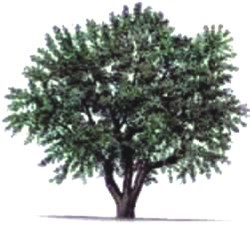|
A Roman Column
The Nectar of Gods: Olive Oil -1
The Tree
Neeman Sobhan
Imagining a classic and characteristic landscape of Italy would conjure a hillside covered with olive groves: rows of short, wizened trees, their dusty grey-green leaves shimmering in the sunlight. It is said that the olive tree has been part of man's history for as long as recorded memory goes, and there is something almost human and world weary about the olive tree's hunch-back shape. 
Yet, I find it ironic that according to ancient Greek Mythology, of all the varieties of trees, especially the majestic ones soaring heavenwards, it is the humble, earthbound and scraggly old olive tree, which is said to be rooted in divine beginnings!
Greek legend has it that the goddess Athena faced the god Poseidon in a competition in which the victor would sponsor and give his or her name to the most magnificent city in Greece. The challenge was to produce a gift that would be determined to be the most useful and valuable to the citizens. Poseidon created the first horse, but Athena, goddess of peace and wisdom, caused to sprout a tree “capable of giving a flame for lighting up the night; of soothing wounds; of being a precious food, both rich in flavour and a source of energy”. She had created the first olive tree!
Needless to say, Athena won the contest and the city of Athens took her name, and since then, men have widely cultivated and judiciously used her gift. At face value, the stumpy olive tree is not only not aesthetically as pleasing as Poseidon's horse, it also produces a most acrid tasting fruit which cannot be eaten unless properly cured. Also, extracting oil from the olives is a long and intricate process. Given these facts, it is a testament to man's imagination, ingenuity and persistence that for thousands of years since its birth, this tree and its fruit have been put to such good service and consequently been so prized all over the world.
In Italy, olive trees have grown as early as 1200 B.C; others believe the date to be 600 B.C. In the Middle East, olive trees have grown wild since before recorded time. The Bible, the Talamud, and Pliny, all refer to the olive as a basic crop in the biblical lands.
The olive tree, which is an evergreen, has a life span of 300-700 years and there are trees in Italy, which are over 1000 years old. Of the total number of olive trees growing in the world, 93% are in the Mediterranean countries, and the current number is supposed to be 850 million AND ONE. And that ONE stands in my back garden!
It is a known fact that olive trees may not bear fruit until 5 to 8 years, and their full production starts from 35-150 years of age. But when they do produce fruit, an average tree can yield 33 to 44 pounds of olives per year, which is equivalent to 3 or 4 litres of oil per year. Since I can count the olives on my tree, I do not foresee even a drop of home produced olio in my lifetime and my l'ulivo tree must remain just a symbol.
But what a symbol, if we recall the most famous reference to the olive tree in the Book of Genesis: the dove carrying an olive branch to Noah on the Ark. That branch gave physical evidence that the floodwater had subsided revealing tree-bearing land, which also reflected the ebbing of God's wrath, signaling a time of peace. Since then, the olive branch has been synonymous with a peace offering.
 Also, the olive is an extraordinarily hardy plant, and when its main trunk dies, new shoots sprout around its base and grow into a new tree (giving it its misshapen form). History records that when the Athenians returned from the Median wars, they found their city razed to the ground, but the gift of Athena, their sacred and faithful olive had survived and prevailed over war and destruction! It was thus, a symbol for tenacity and continuity. Also, the olive is an extraordinarily hardy plant, and when its main trunk dies, new shoots sprout around its base and grow into a new tree (giving it its misshapen form). History records that when the Athenians returned from the Median wars, they found their city razed to the ground, but the gift of Athena, their sacred and faithful olive had survived and prevailed over war and destruction! It was thus, a symbol for tenacity and continuity.
In Italy, L'Ulivo or the olive Tree in politics denoted the successive centre-left Italian political coalition from 1995 to 2007. Only this year has marked the political loss of the Left. But if the party's symbol has any truth, this momentary failure marks not demise but the promise of sprouting back again.
Whatever the Olive tree means as a symbol, in real terms as part of the landscape and in the diet of the people as the precious oil derived from it, the olive tree is one of the most important and prized things of Italian life. 'Vino, Olio e Pane', which means, 'Wine, Olive Oil and Bread', spell not just nourishment and contentment for an Italian, but the very essence of all that is good in life. Thus if the old Latin phrase 'In vino, veritas' means 'in wine lies truth', the unspoken Italian saying would be: 'In olio, vita'--'In olive oil is contained life'.
Next Week:
The Nectar of Gods: Olive Oil-2 (the Oil) Copyright
(R) thedailystar.net 2008 |
|
